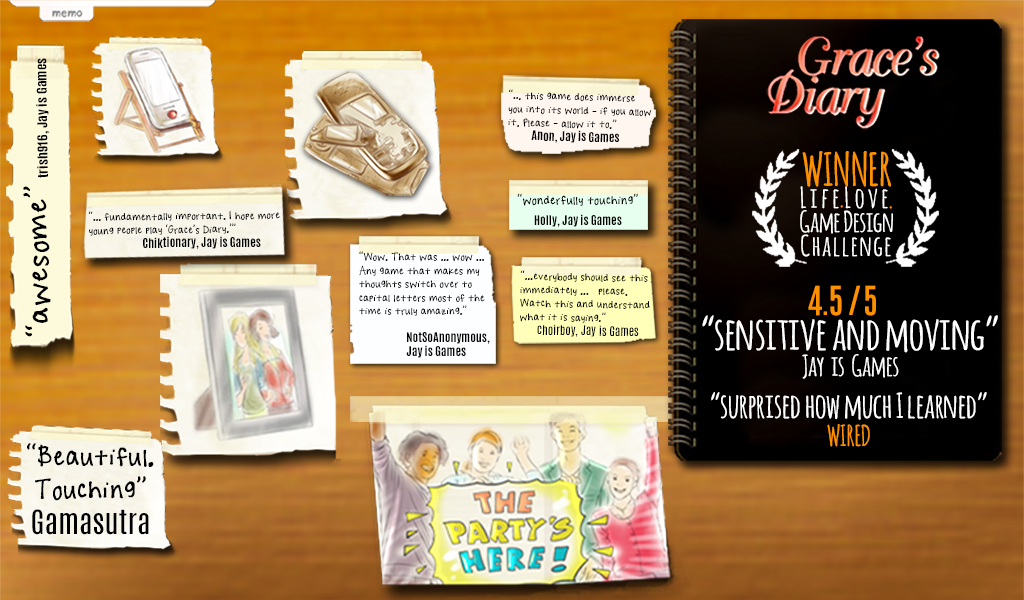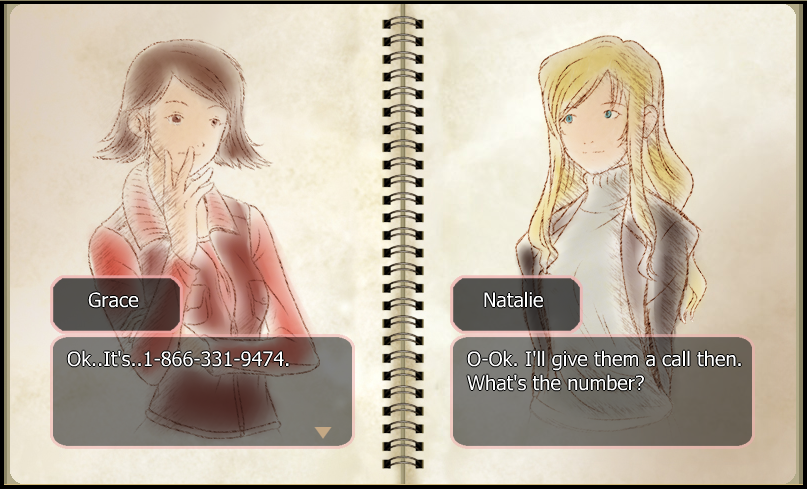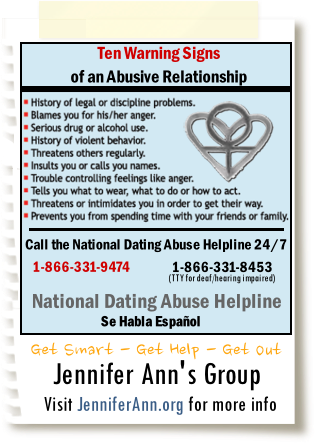Video games have been found effective at raising awareness and promoting violence prevention.

“When Grace’s mother tells her to get back in the car… and to not bother telling Natalie’s mother, I was absolutely appalled.”
“By the end I got to really despise Natalie’s boyfriend.”
“...this actually happens, and makes it so much more terrible…”

These are just some of the comments from players of a game called Grace’s Diary. Unlike many of the more mainstream games, Grace’s Diary doesn’t feature mining, materials, shooting, or random dance moves. Instead, Grace’s Diary follows the protagonist, Grace, as she reflects on and tries to speak with her friend Natalie about Natalie’s relationship with her abusive boyfriend, Ken.
Real quotes from players:
“This game will probably be so helpful for me and my friends later on. I just hope that won’t happen to any of us.”
“… we know or will know a Natalie at some point in our lives, or are/will become a Natalie ourselves.”
“… getting the message out… that violent and controlling relationships are not normal or acceptable is fundamentally important.”

An initiative of the Gaming Against Violence program from the non-profit Jennifer Ann’s Group, Grace’s Diary is one of their many games which are targeted at informing and educating players around issues related to abusive dating behavior. Although most of the group’s serious video games address teen dating violence (TDV), they also cover related subjects like consent, healthy relationships, and the impact of peer pressure and social media.
While Natalie’s story is revealed through a series of observations, dialogue choices and point-and-click-puzzles, the charity is not limited to any one set approach. The video games they publish tackle the issues from a variety of genres including dating-sims, lo-fi RPGs, persuasive art, and escape-the-room simulators.
Important exceptions however are first-person-shooter and fighting games, which run counter to the non-violence message Jennifer Ann’s Group is trying to promote.

With a number of recent studies highlighting the pressing concern of TDV, as well as the difficulties educational institutions have had in successfully addressing it, TDV video games are seen by the group as an effective tool to help tackle the shortfall.
“Abusive dating behaviour is a nuanced and sensitive subject,” Drew Crecente, founder and executive director of Jennifer Ann’s Group explains. “What the research has shown is that traditional learning methods alone aren’t sufficient to address it. Adolescents often don’t feel comfortable discussing dating – especially dating abuse – with their parents, let alone with teachers; if we can’t get the conversation started then raising awareness and promoting prevention is incredibly difficult.”
if we can’t get the conversation started then raising awareness and promoting prevention is incredibly difficult
Lack of Awareness is a Critical Problem
Lack of awareness around the problem is a key issue, with one parental survey finding that 81% of participants either didn’t believe TDV was an issue, or admitting that they didn’t know it was an issue (Women’s Health, 2004).
This is despite another study showing that over 40% of U.S. students have been in an abusive relationship by the time they graduate from college, with nearly 1.5 million high school students physically abused by a dating partner every year (Forke, et al., 2008).
The challenges with tackling abusive dating behaviours unfortunately don’t stop there. Another study found that among teens who had been in an abusive relationship, only 32% confided in a parent. Of those that confided, 78% then went on to stay in the relationship despite the advice of their parent (Liz Claiborne Inc., 2009).

For Educators
As for addressing the issue in a traditional educational setting, fewer than half of state schools in the U.S. are either required or encouraged to include TDV in their curriculum. In addition, even in those states where legislation has been passed requiring the development of safety plans, enforcement of protective orders, and education of students, a lack of funding has proved an issue for some school districts with implementation of these measures hindered as a result.
Even in school systems which have been able to implement TDV programs the results have been disappointing, with a recent review concluding that they were not affecting “to a significant extent” TDV perpetration and victimisation behaviours (De La Rue, et al. 2016).
This is where video games come in. By championing games that explore and dissect abusive dating behaviours, and making them free and readily available, the Gaming Against Violence program from Jennifer Ann’s Group works to draw on some of the powerful features of gaming to turn them to their advantage.
“Gaming plays a significant role in many teenagers’ lives,” says Drew, “and we’ve found that by tapping into that we can effectively help guide and nurture prosocial behaviour.
“Video games are engaging, they enable players to explore and progress at their own pace, and they present scenarios in a way that is contextually interesting and highly relatable. These are qualities any educational resource should aspire to and is an objective we thought worth pursuing.
“The research around TDV video games validates this stance. By providing these as free resources for schools and classrooms we can help encourage TDV programs where there previously weren’t any, as well as strengthen those that already exist.”
Studies investigating the results of TDV video games on educational development have confirmed that compared to control groups TDV game players show a significant improvement in attitude relating to relationship abuse and gender norms. One study concluded that TDV players were “less accepting of angry behaviours” in relationships as compared to players of the control game (Jacobs, 2017).
For Parents Too
The benefits of TDV video games aren’t just limited to the classroom either. Part of the concept that Jennifer Ann’s Group promotes is the ability to nurture and encourage conversations at home as well.

“As a parent it can be very awkward trying to start conversations about abusive dating behaviour; even harder than some of the other more well-known ‘difficult talks’ like alcohol, drugs, and sex,” says Drew.
“To have that kind of conversation, and at the young ages that we’re now finding it’s required, it can be tough for a parent to even know where to begin.
“With TDV games, parents can first play through a game themselves, get their own education around the subject, then introduce their child to the same game. The dynamic of the conversation subsequently changes.
“For the child, it doesn’t feel like it’s a talk focused on them and their behavior, but instead a talk about the characters and actions in the game; that change in perspective removes a lot of the pressure. This makes it easier for parents and their kids to focus on the problematic issues we are addressing through these games and from there we can encourage a real, constructive dialogue.”
it can be tough for a parent to even know where to begin
Even if parents aren’t yet ready to engage, if a child is going through their own personal experience of TDV or abuse the games are still beneficial. By demonstrating that what they’re facing is not an isolated issue affecting them and them alone, and that the behaviour is neither healthy nor acceptable, it can help them to understand that they are not powerless in the face of it.
And for Teens
For teenagers who have not experienced TDV or other abusive dating behaviours (problems which can affect all adolescents regardless of gender, socio-economic status, race, ethnicity, or sexuality) it also helps reduce the chance they ever will.

| Play now | Download for Windows | jag.itch.io/graces-diary |
| Development | GP Touch | @himatako (Twitter) |
| Produced by | Jennifer Ann’s Group | @stopTDV (Mastodon) |
| Published by | Life Love Publishing | @LifeLovePublish (Mastodon) |
| RightRating™ | Everyone | No ads. No in-app purchases. No loot boxes. No privacy tracking. |
* If you or anyone you know is a victim of abusive dating behaviour, at any time, it is urged you seek help at the earliest opportunity. In the U.S., those needing assistance can contact the National Dating Violence Helpline at 1-866-331-9474.
February is National Teen Dating Violence Awareness and Prevention Month and April is Sexual Assault Awareness Month.
Support this work by donating online:
PayPal
Apple Pay
Gaming Against Violence is an award-winning program presented by Jennifer Ann's Group, a 501(c)(3) nonprofit charity [EIN: 20-4618499].


